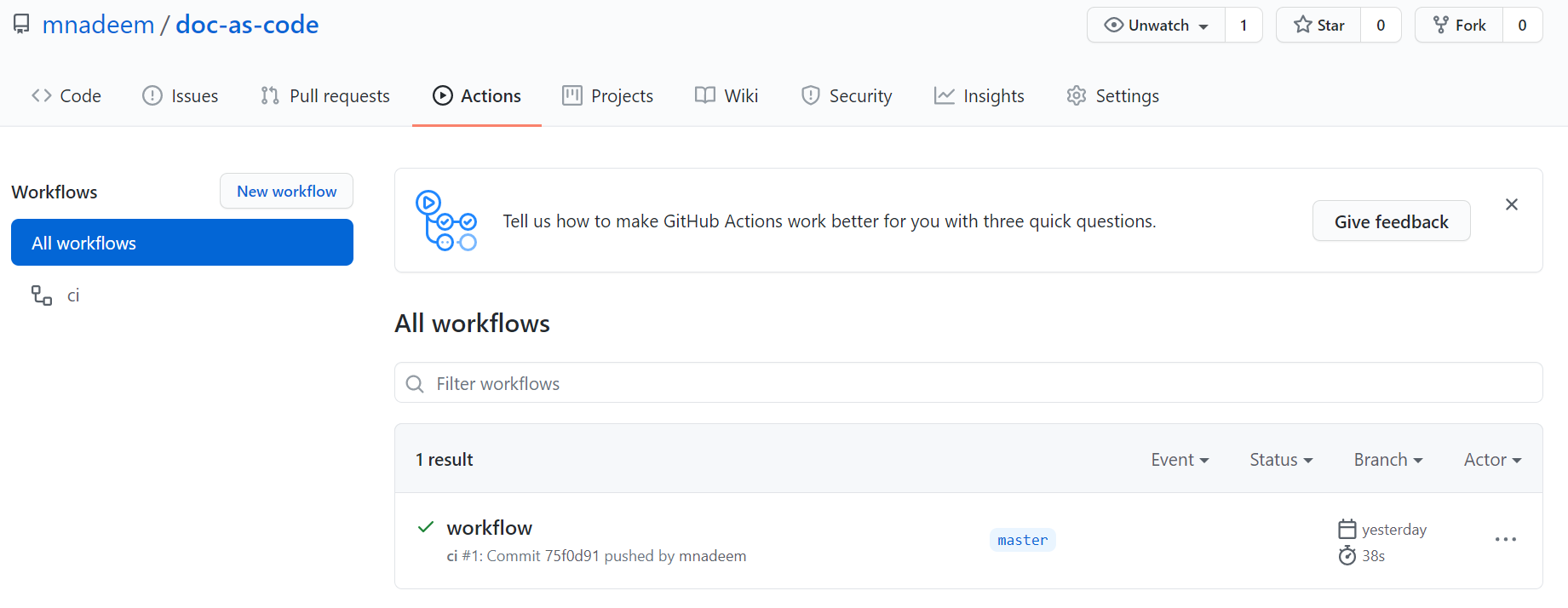Deploying
Markdown pages needs to be converted to HTML pages, and should be deployed to a place to be served.
Normally markdown is pushed to main/master branch 🔀 and in case of github, the static contents are automatically served rom gh-pages branch
Manually¶
The following command would build the current branch and push the static site to gh-pages branch, if you are doing this for the first time, gh-pages brach might not exist in this case it would automatically create this branch for you.
mkdocs gh-deploy
Sample output
INFO - Cleaning site directory
INFO - Building documentation to directory: E:\mkdocs\doc-as-code\site
INFO - Documentation built in 1.66 seconds
INFO - Copying 'E:\mkdocs\doc-as-code\site' to 'gh-pages' branch and pushing to GitHub.
INFO - Your documentation should shortly be available at: https://mnadeem.github.io/doc-as-code/
Automatically¶
Github Actions ⚙️¶
Using GitHub Actions you can automate the deployment of your project documentation. At the root of your repository, create a new GitHub Actions workflow, e.g. .github/workflows/ci.yml, and copy and paste the following contents: 👇
name: ci
on:
push:
branches:
- master
jobs:
deploy:
runs-on: ubuntu-latest
steps:
- uses: actions/checkout@v2
- uses: actions/setup-python@v2
with:
python-version: 3.x
- run: pip install mkdocs-material
- run: mkdocs gh-deploy --force

Jenkinsfile ⚙️¶
If you have the following infrastructure
- Jenkins Instance
- Docker agent where mkdocs is installed.
- Jenkins pipleline infrastructure
Further do the following 👇
- Creating a Jenkins job (if you dont have organization plugin)
- Adding github webhook (if you dont have organization plugin)
- Adding Credentials to Jenkins instance
Then Use the following jenkinsfile 👇
pipeline {
agent { label 'docker-mkdocs-slave' }
environment {
ORG = 'Your ORG' // This should be CHANGED
REPO = 'Your Repo' // This should be CHANGED
CREDENTIALS_ID = '{{JenkinsCredentialId}}' // This should be CHANGED
MKDOCS_VERSION = '1.0.4'
LC_ALL='en_US.utf-8'
LANG='en_US.utf-8'
}
stages {
stage('Build & Deploy Docs') {
when { branch 'master' }
steps {
withCredentials([usernamePassword(credentialsId: "$env.CREDENTIALS_ID", usernameVariable: 'USERNAME', passwordVariable: 'PASSWORD')]) {
sh """
. /etc/profile.d/jenkins.sh
git config --global user.name "${USERNAME}"
git remote set-url origin https://${USERNAME}:${PASSWORD}@github.com/${env.ORG}/${env.REPO}.git
export GIT_USER=${USERNAME}:${PASSWORD}
export GITHUB_HOST=github.com
mkdocs gh-deploy --force
"""
}
}
}
}
}
GitLab Pages ⚙️¶
If you're hosting your code on GitLab, deploying to GitLab Pages can be done by using the GitLab CI task runner. At the root of your repository, create a task definition named .gitlab-ci.yml and copy and paste the following contents: 👇
image: python:latest
pages:
stage: deploy
only:
- master
script:
- pip install mkdocs-material
- mkdocs build --site-dir public
artifacts:
paths:
- public